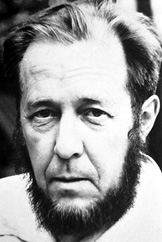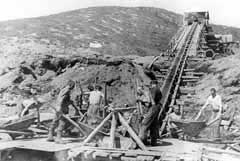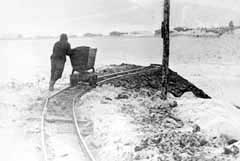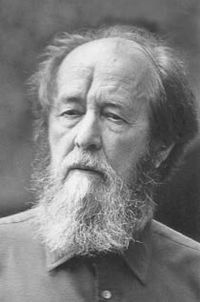 |
| Alexandr Solzhenitsyn |
The interesting thing about Aleksandr Solzhenitsyn is that he spent eight years in Russian prisons for criticizing Joseph Stalin, yet this didn’t deter him from finding a way to criticize the injustice and brutality of the gulag prisons Stalin used to advance the Soviet economy. He was given the Nobel Prize for literature in 1970 for the novel, One Day in the Life of Ivan Denisovich, which exposed the gulag system in Russia. He later wrote other novels that exposed the Soviet government system as dependent on brutality and the threat of these horrible prisons for its survival. 50 million people, many of whom were political and religious prisoners, lost their lives in gulags between 1930 and 1950. Aleksandr Solzhenitsyn’s book began a change in the Soviet Union that finally had an outcome in bringing down the Berlin Wall in 1989.
 |
| Kolyma |
Aleksandr Solzhenitsyn had a double degree in mathematics and physics. For a portion of time during his imprisonment this kept him from hard labor until he was moved to a prison for political prisoners where everyone did hard labor. He was a Stalinist before prison, but emerged as a Christian. He wrote secretly for years, recording his and other prisoners' experiences. He used these experiences to write several novels, some of which he had to publish illegally. When he won the Nobel Prize, he didn’t want to leave Russia, fearing he would not be allowed back in. He was a citizen who loved his country and sought positive change for it. He was later regarded as threatening and was exiled from Russia. He lived in the United States during those years.
 |
In his acceptance speech for the Nobel Prize he didn’t hesitate to criticize what he saw as failings in the United States; a decline of courage, well-being at the cost of values, social legalism, materialism, the direction and power of the press that is too powerful without responsibility, socialistic tendencies and shortsightedness. His analysis of the American involvement in the Vietnam War is interesting as he felt there was little understanding in this and subsequently it became a “cruel mistake” of the pacifist anti-war movement that led to the betrayal of the 30 million Vietnamese who now suffer under a communist system. He held them responsible for America “losing its nerve” in Vietnam. He felt humanism and despiritualization are at the core of the weakening of American society in spite of technological advance.
For Aleksandr Solzhenitsyn, being a good citizen meant not accepting practices that were humanly degrading and immoral. He returned to his country in 1994 after the fall of communism. In 1997 the Solzhenitsyn Prize for Russian writing was established.
 |
| Solzhenitsyn |
Page created on 11/8/2007 2:39:35 PM
Last edited 9/15/2018 10:54:31 PM
